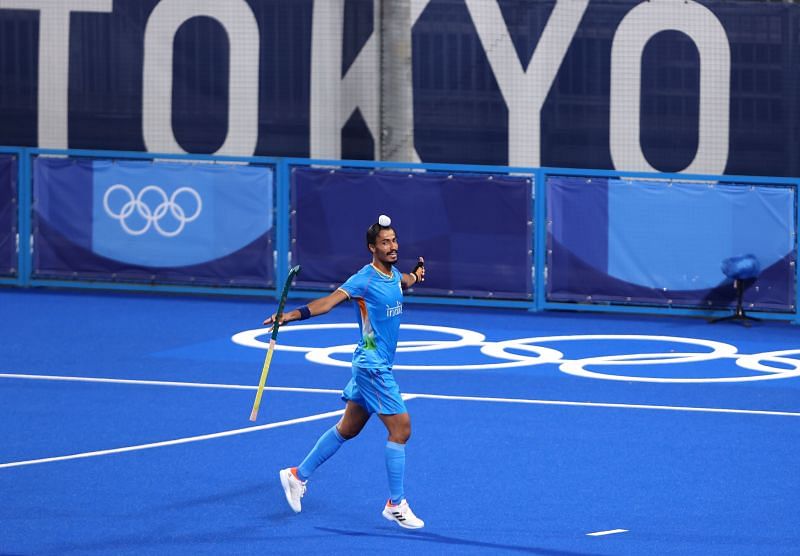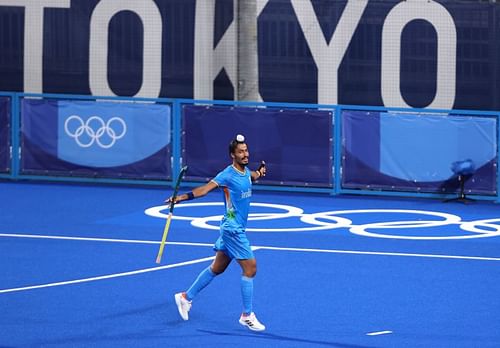
Indian hockey striker Dilpreet Singh fortunate to have been a part of historic Olympic campaign

Indian men’s hockey team striker Dilpreet Singh is a vital cog in the team’s set-up. The versatile forward rose up the ranks from the junior team and has now been a part of most of the senior Indian hockey team’s exploits.
Dilpreet rose to fame with eye-catching performances in the Sultan of Johor Cup with the Indian youth hockey team. A spot in the senior Indian men’s hockey team was almost a give-away, given his scintillating performances on the junior circuit.
The striker slowly became part of the senior hockey team in major tournaments, including the Commonwealth Games, the Asian Games and the Hockey World Cup.
Dilpreet was a live-wire in the Indian men’s hockey team’s historic outing at the recently concluded Tokyo Olympics 2021. The Indian men’s hockey team won the bronze medal beating Germany 5-4 and won a hockey medal at the Olympics after 41 years.
Also Read: Hockey: Manpreet Singh feels it's time to stop basking in Tokyo Olympic glory
The 21-year-old striker scored India’s lone goal in the 1-7 drubbing against Australia in the league stage before scoring the opening goal against Great Britain in the quarter-finals. It set the tempo and tone for the Indian hockey team.
He even set up many opportunities for his teammates and Dilpreet terms the experience of playing for India at the Olympics a fortunate one. He said:
"We all worked so hard to achieve this feat. We never let any difficulties during the pandemic affect our morale. The seniors played a big part in encouraging us constantly and making us feel like we can do this. I feel so fortunate to have been part of this incredible group and yes, I do believe I have been lucky to have had such a great start to my international career.”
Turning point in Dilpreet’s hockey career
Although just 21-years-old, Dilpreet’s path was strewn with obstacles at many stages. After the Hockey World Cup in 2018, where the Indian men’s hockey team were ousted in the quarter-finals, Dilpreet lost his spot in the team.
However, constant support from Hockey India and the Indian hockey team’s support staff kept the Punjab-born player sane and committed to making a comeback. Dilpreet explained:
"Looking back, surely that was not an easy period for me. Maybe I could not handle the success of getting to play in such major tournaments so early in my career. I was hardly 18 or 19 years old then. But I am really grateful to Hockey India and the support staff who gave me all the support I needed back then and helped me mature as a player."
A meeting with Indian men’s team head coach Graham Reid was one of the turning points in Dilpreet’s career. The words of the experienced coach motivated the youngster and he made sure to leave no stone unturned to get back into the senior Indian men’s hockey team. Dilpreet said:
“The junior hockey team coaches guided me all through 2019 and I also worked closely with the psychologist in Sports Authority of India, Bengaluru at that time. After Indian men’s hockey team’s chief coach Graham Reid took over, he watched me during training and spoke to me personally and that motivated me a lot. After I got a chance to come back to the senior Indian hockey team, there has been no looking back.”
The Tokyo Olympics 2021 have put the Indian hockey on a pedestal and the team has breached a new benchmark. Dilpreet feels the Indian hockey now has the mettle to keep proving themselves consistently and reach greater heights. He said:
"I truly believe this is a new beginning. We all want to achieve more, and we want people to give us more love and continue to support us. And for this to happen, we know we must consistently perform well at major tournaments. We are mentally prepared for it.”
Also read: Indian hockey team needs to match the level of Australia and Belgium consistently, says Graham Reid